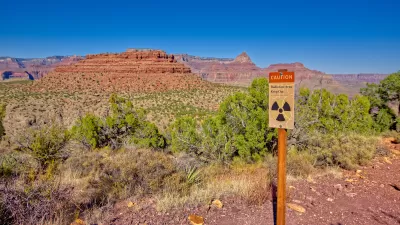Renewable energy, both wind and solar, takes up a lot of space in places that aren't accustomed to industrial development. Policymakers need strategies and tactics for overcoming the inherent land use challenges presented by renewable energy.

Samantha Gross writes about the land use complications with renewable energy generation and transmission, and the local opposition that arises as a result. Unfortunately, writes Gross, "[the] inherent attributes of wind and solar generation make conflicts over land use and project siting more likely."
Gross lists more than just a few of those inherent attributes. But there's also reason for hope that some of those inherent attributes and the resulting local opposition can be overcome:
Offshore wind eliminates land use, but it raises opposition among those concerned with the impact on the environment and scenic views. Building on previously disturbed land and combining renewable power with other land uses, like agriculture or building solar on rooftops, can minimize land use conflicts. Community involvement in project planning and regulations for land use and zoning can help to alleviate concerns.
The text sampled here is pulled from the executive summary of a longer report, published this month [pdf], intended to help policymakers overcome land use obstacles standing in the way of a lower-carbon energy system.
FULL STORY: Renewables, land use, and local opposition in the United States

Planetizen Federal Action Tracker
A weekly monitor of how Trump’s orders and actions are impacting planners and planning in America.

Chicago’s Ghost Rails
Just beneath the surface of the modern city lie the remnants of its expansive early 20th-century streetcar system.

San Antonio and Austin are Fusing Into one Massive Megaregion
The region spanning the two central Texas cities is growing fast, posing challenges for local infrastructure and water supplies.

Since Zion's Shuttles Went Electric “The Smog is Gone”
Visitors to Zion National Park can enjoy the canyon via the nation’s first fully electric park shuttle system.

Trump Distributing DOT Safety Funds at 1/10 Rate of Biden
Funds for Safe Streets and other transportation safety and equity programs are being held up by administrative reviews and conflicts with the Trump administration’s priorities.

German Cities Subsidize Taxis for Women Amid Wave of Violence
Free or low-cost taxi rides can help women navigate cities more safely, but critics say the programs don't address the root causes of violence against women.
Urban Design for Planners 1: Software Tools
This six-course series explores essential urban design concepts using open source software and equips planners with the tools they need to participate fully in the urban design process.
Planning for Universal Design
Learn the tools for implementing Universal Design in planning regulations.
planning NEXT
Appalachian Highlands Housing Partners
Mpact (founded as Rail~Volution)
City of Camden Redevelopment Agency
City of Astoria
City of Portland
City of Laramie





























